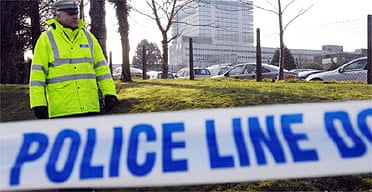A suspect has been arrested in connection with the recent series of letter bomb attacks, police said today.
The officer leading the investigation described the step as "very significant", but warned that organisations should remain alert for more possible devices in the post.
The suspect, understood to be a man in his 20s, was arrested near Cambridge by detectives investigating the attacks, which targeted businesses linked to forensic science laboratories and traffic enforcement.
The man is being held in connection with all seven letter bombings, which police now believe are linked. At least nine people were injured in the blasts.
According to reports, the man was arrested at a house in Cherry Hinton, near Cambridge, at 3am. The property was cordoned off.
Anton Setchell, the Association of Chief Police Officers' national coordinator for domestic extremism, said forensic teams were beginning a "lengthy search" of the address, which would last for "several days".
"At this stage, I am not able to guarantee that there is not another postal package containing an explosive device within the postal system," he said. "The previous seven devices have all been contained in A5-size, jiffy-type padded envelopes.
"I am therefore renewing my request for the public to maintain their vigilance and not to handle any post which appears in any way suspicious."
He urged anyone suspicious about a package arriving in the post to contact police immediately.
The bombs were sent in two main groups. The first three, on January 18, were sent to forensic science laboratories in the Oxfordshire and West Midlands areas.
Another three were sent earlier this month to the offices of companies with links to traffic enforcement in London, Berkshire and Swansea.
These included the Driver and Vehicle Licensing Agency, in Swansea, and the offices of the company that runs London's congestion charging system. The packages arrived on three consecutive days, but police now believe all three were posted on the same day.
In between the two clusters, a device was sent to a house in Folkestone, Kent, which is used as a business address.
In each case, the bomb was a home-made, pyrotechnic-style device. At least two contained glass, and one package had a Cambridgeshire postmark.
Detectives have also been liaising with Cambridgeshire police over a parcel bomb attack on a local Labour party office in Cambridge last August.
Earlier this month, police urged companies and organisations throughout the country to be on alert over possible letter bombs.
The warning was issued after a letter bomb exploded at the DVLA centre in Swansea on February 7, slightly injuring a woman.
The DVLA blast reinforced fears that a disgruntled driver, or someone else with a grudge against motoring enforcement bodies, had launched a concerted letter bombing campaign.
The attack followed a blast at the offices of the accountancy and finance company Vantis, in Wokingham, Berkshire, on February 6, in which two people were slightly injured. Speed Check Services, which provides technology for speed cameras, is a Vantis client.
On February 5, a bomb stuffed into a padded envelope exploded in the hands of a post room worker at the central London offices of Capita, the firm that collects the capital's congestion charge. The woman, who sustained blast wounds to her hands and stomach, was treated in hospital.
After the DVLA attack, police in Kent said they were investigating a letter bomb that exploded at the home of a 53-year-old man in Folkestone on February 3. He suffered minor injuries.
According to some reports, the man was the manager of a company providing security services to companies and had collected the package from his business address before opening it at home.
The three letter bombs sent to companies in Oxfordshire and the West Midlands last month had a similar return address. Barry Horne, an animal rights extremist who died in 2001 while serving an 18-year jail sentence for a firebombing campaign, was named on the back of one.
